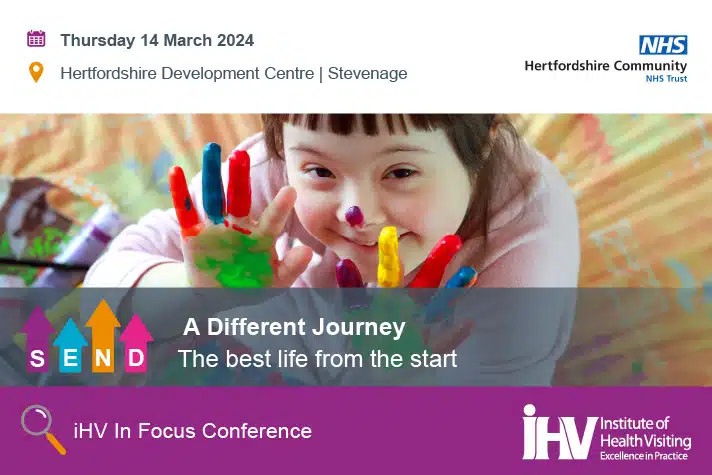It is great to see that supporting children with SEND is a key priority across government and the healthcare system in 2024. The year will get off to a flying start in parliament with the All Party Parliamentary Group (APPG) for Special Needs and Disabilities (SEND) meeting on Tuesday 9 January.
We are delighted that Alison Morton, iHV’s CEO, has been asked to provide a keynote presentation on the vital role that health visitors play, supporting both parents and babies and young children during the earliest years of life.
The session is being hosted by cross-party MPs, Olivia Blake MP (chair) and vice chairs Sally-Ann Hart MP, Marsha De Cordova MP, James Sunderland MP, Andy McDonald MP, with secretariat provided by the National Association of Head Teachers. The APPG session will concentrate on the critical importance of early intervention in the context of SEND. This includes:
- The significance of early identification of SEND.
- Ensuring timely and appropriate support for those identified.
- The barriers in place and proposed solutions.
Other speakers on the panel are: Claire Bithall – Parent of a 9-year-old autistic son; Allison Walker – SENCO at Lloyd Park Children’s Charity; Alex Dale and Phil Haslett – f40 Group; Beatrice Merrick – Chief Executive, Early Education; Cath Lowther – General Secretary, Association of Educational Psychologists; and Natalie Browne – 0-5 Team Manager Havering Council.
In 2024, the Institute of Health Visiting will be leading and engaging in a number of other programmes of work to improve the support for babies and young children with SEND and their families. This is an area that will demand increased attention from health visiting teams and we encourage all health visitors to keep abreast of the latest evidence and policies in this space.
iHV SEND conference
To support health visiting teams, we are hosting our very first iHV SEND conference on 14 March 2024 just outside London in Hertfordshire. The one-day conference will be jam-packed with updates from across a breadth of SEND priority areas and is available as an in-person or online delegate options.
Providing better joined-up support to improve the outcomes for children with SEND is a national priority and requires a multi-agency approach. Our SEND conference aims to equip health visitors and early years practitioners (and anyone looking to improve outcomes for babies and young children with SEND and their families) with new knowledge and skills to support better early identification of need and joined up support.
We have a fantastic line-up of high-profile national speakers including: Dame Rachel de Souza – The Children’s Commissioner for England; and Professor Simon Kenny OBE– national clinical director for children and young people and national cerebral palsy pathway group chair. With a breadth of experience, our speakers will present on the current national SEND priorities and encompass evidence-based practice and the latest research on a wide range of SEND topics from experts in their field, including experts with lived experience.
Our conference will also provide an excellent opportunity to network with multi-agency professionals and leading SEND experts from across the UK, as well as charities and exhibitors to support your work in this area.
Don’t miss out on this wonderful opportunity to enhance your health visiting practice and make a difference to babies and children with SEND.
All our conference tickets are subsidised to keep ticket prices as low we can and ensure that as many people as possible can attend. Our early bird ticket sales are open – book at further discounted rates by 31 January 2024.




